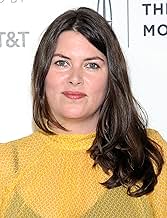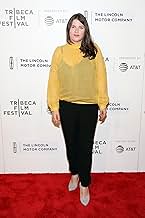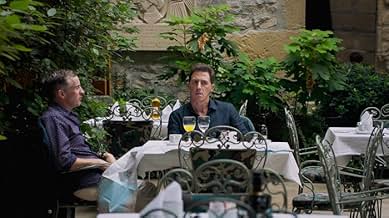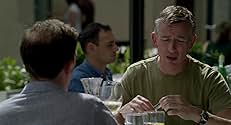NOTE IMDb
6,6/10
6,6 k
MA NOTE
Ajouter une intrigue dans votre langueActors Steve Coogan and Rob Brydon embark on a six-part episodic road trip through Europe. This time they're in Spain, sampling the restaurants, eateries, and sights along the way.Actors Steve Coogan and Rob Brydon embark on a six-part episodic road trip through Europe. This time they're in Spain, sampling the restaurants, eateries, and sights along the way.Actors Steve Coogan and Rob Brydon embark on a six-part episodic road trip through Europe. This time they're in Spain, sampling the restaurants, eateries, and sights along the way.
- Nomination aux 1 BAFTA Award
- 1 victoire et 1 nomination au total
Avis à la une
When I visited Spain for the first time many years ago, I immediately felt a sense of foreboding, as if I was being reminded of some long buried event, perhaps in another lifetime. Everything that happened during my stay there did nothing to dispel those feelings either and I have never gone back. Of course, I did not have the amenities available to English actors and comedians Steve Coogan ("The Dinner") and Rob Brydon ("The Huntsman: Winter's War") in Michael Winterbottom's ("On the Road") The Trip to Spain. Based on a TV series, it is the third in a series of "trip" films that follows the 2010 film "The Trip" (to Northern England), and the 2014 "The Trip to Italy." I wish I could say that the movie was a "trip" but, even though I did not experience any foreboding while watching it, I found it to be an essentially empty and only sporadically funny experience.
Master impressionists as well as stand-up comedians, actors and screenwriters, Coogan and Brydon drive through Spain from Santander to Malaga, avoiding the well known tourist spots to visit small town Spain, places such as Getaria, Axpe near Bilbao, Prejano, Sigüenza, Almagro, and Malaga that we never hear about. They eat exquisite looking food, visit historic sites, and, of course, provide a staggering ton of impressions including those of Michael Caine, Mick Jagger, Robert de Niro, Marlon Brando, Roger Moore and many others. It goes without saying that driving a Range Rover for a thousand miles, staying in expensive hotels and eating in posh restaurants is not an experience that is readily available to most people.
Of course, they are good comedians and some of the routines garner a lot of laughs, like the wordplay on the Moors and the family of Roger Moore, a sequence which is funny but unfortunately goes on too long. They also riff on James Bond movies, the Spanish Inquisition, and the character of Don Quixote which leads to their donning costumes and sitting on donkeys for a photo shoot. Playing fictionalized versions of themselves, the rationale for the trip is that Rob is going to write a series of restaurant reviews for The Observer and Steve is gathering notes for a book comparing his trip to Spain when he was younger with this new middle-aged one.
While both men are outward successes, the two remain basically insecure and their prickly banter often has a sharp edge to it. Though Steve adapted the Oscar-nominated film "Philomena" for the screen (a fact he is not hesitant to throw in Rob's face with sickening regularity), his agent has walked out and he is dismayed by the fact that the studio is bringing in a new writer to "polish" his script for a new film. Steve is in love with Mischa (Margo Stilley, "The Royals" TV series), who is now married, but she turns down his offer to visit him on his trip. Rob, though he recently appeared in a big-budget Hollywood movie, seems to have become reconciled to being a supporting actor but longs for a starring role. One revealing segment takes place when a young busker performing near a restaurant for gratuities is invited by Steve to have a drink with them.
Everything goes well until the musician starts recommending good places to visit in Spain which Steve finds threatening to his self image of being a man of the world and gets up and walks away from the table. While critics have found the repetitious format of the first two films to have become stale, not having seen the first two, I have no basis for comparison. For me, however, The Trip to Spain quickly became stale and tedious all on its own. The only music in the film is the lovely but overdone 1960s song, "The Windmills of Your Mind." In the land of Flamenco, however, we do not hear or see any, nor is there any more than a passing interest in the food being served.
The world travelers do not meet or talk to any Spaniards other than waiters, bell boys or old girlfriends. There is talk about dinosaurs and we get some history lessons but there is no mention of Goya, Garcia-Lorca, Juan-Ramon Jimenez, Gaudi, Casals, Segovia or the Prado. Spanish poet and mystic San Juan de la Cruz said, "In savoring the finite joy, the very most one can expect is to enfeeble and destroy our taste and leave the pallet wrecked." The film may showcase the Spain you will find in a National Geographic special, but it is Spain without its heart and its sou
Master impressionists as well as stand-up comedians, actors and screenwriters, Coogan and Brydon drive through Spain from Santander to Malaga, avoiding the well known tourist spots to visit small town Spain, places such as Getaria, Axpe near Bilbao, Prejano, Sigüenza, Almagro, and Malaga that we never hear about. They eat exquisite looking food, visit historic sites, and, of course, provide a staggering ton of impressions including those of Michael Caine, Mick Jagger, Robert de Niro, Marlon Brando, Roger Moore and many others. It goes without saying that driving a Range Rover for a thousand miles, staying in expensive hotels and eating in posh restaurants is not an experience that is readily available to most people.
Of course, they are good comedians and some of the routines garner a lot of laughs, like the wordplay on the Moors and the family of Roger Moore, a sequence which is funny but unfortunately goes on too long. They also riff on James Bond movies, the Spanish Inquisition, and the character of Don Quixote which leads to their donning costumes and sitting on donkeys for a photo shoot. Playing fictionalized versions of themselves, the rationale for the trip is that Rob is going to write a series of restaurant reviews for The Observer and Steve is gathering notes for a book comparing his trip to Spain when he was younger with this new middle-aged one.
While both men are outward successes, the two remain basically insecure and their prickly banter often has a sharp edge to it. Though Steve adapted the Oscar-nominated film "Philomena" for the screen (a fact he is not hesitant to throw in Rob's face with sickening regularity), his agent has walked out and he is dismayed by the fact that the studio is bringing in a new writer to "polish" his script for a new film. Steve is in love with Mischa (Margo Stilley, "The Royals" TV series), who is now married, but she turns down his offer to visit him on his trip. Rob, though he recently appeared in a big-budget Hollywood movie, seems to have become reconciled to being a supporting actor but longs for a starring role. One revealing segment takes place when a young busker performing near a restaurant for gratuities is invited by Steve to have a drink with them.
Everything goes well until the musician starts recommending good places to visit in Spain which Steve finds threatening to his self image of being a man of the world and gets up and walks away from the table. While critics have found the repetitious format of the first two films to have become stale, not having seen the first two, I have no basis for comparison. For me, however, The Trip to Spain quickly became stale and tedious all on its own. The only music in the film is the lovely but overdone 1960s song, "The Windmills of Your Mind." In the land of Flamenco, however, we do not hear or see any, nor is there any more than a passing interest in the food being served.
The world travelers do not meet or talk to any Spaniards other than waiters, bell boys or old girlfriends. There is talk about dinosaurs and we get some history lessons but there is no mention of Goya, Garcia-Lorca, Juan-Ramon Jimenez, Gaudi, Casals, Segovia or the Prado. Spanish poet and mystic San Juan de la Cruz said, "In savoring the finite joy, the very most one can expect is to enfeeble and destroy our taste and leave the pallet wrecked." The film may showcase the Spain you will find in a National Geographic special, but it is Spain without its heart and its sou
If you've come along for the other "Trips" with Steve Coogan and Rob Brydon, you clearly know what you're in for and what you want out of "The Trip to Spain," the third installment of the British TV mini-series cut into a feature-length film about two middle-aged friends on a food tour for a magazine.
"Spain" does not mess with the formula. We get all the impersonations, stunning vistas, food porn, literature/poetry references, etc. that we signed up for. The only thing that has changed are where these fictional versions of Steve and Rob are in terms of life stage and how they're dealing with their newly entered 50s in both their careers and personal lives.
If anything, the chemistry between Coogan and Brydon (and director Michael Winterbottom) has only gotten stronger. They're able to devise hilarious bits on the fly even more naturally than before. Unlike "The Trip" and "The Trip to Italy," almost no drama unfolds during the course of the film. Steve and Rob's never-ending game of one-upsmanship is what largely keeps this film afloat, though they each do deal independently with struggles regarding love and family.
As such, "Spain" ends up filling in the portraits of these two friends and their lives with more details, as if the painting was sketched out in "The Trip" and started to be filled in in "Italy." With just about everything else in this movie remaining a constant, we're able to spend more time looking more closely at those details - and by the same token, Winterbottom can add more nuance. The depiction of Steve as Don Quixote and Rob as Sancho Panza creates a solid focal point to better examine these characters, who it turns out are quite like their respective Cervantes creations.
So little about "The Trip" films could be considered mainstream that it feels odd to describe them as cinematic comfort food, but to the set of tastes that have taken to them so far, they are exactly that. The sense of humor, their dynamic and Winterbottom's naturalist approach are so reliable that even with minimal changes from film to film, the series ages well. "Italy" initially felt like a retread, but "Spain" feels like an improvement just by virtue of time, all of its elements and flavors improving and congealing with patience and experience.
All this makes the film's twist ending that much more unexpected. Suddenly there's a hint of plot continuity and it's as though we have no idea what to do with it. How the series proceeds will mean everything, but for now it's just a dash of mystery in an otherwise familiar and enjoyable film.
~Steven C
Thanks for reading! Visit Movie Muse Reviews for more
"Spain" does not mess with the formula. We get all the impersonations, stunning vistas, food porn, literature/poetry references, etc. that we signed up for. The only thing that has changed are where these fictional versions of Steve and Rob are in terms of life stage and how they're dealing with their newly entered 50s in both their careers and personal lives.
If anything, the chemistry between Coogan and Brydon (and director Michael Winterbottom) has only gotten stronger. They're able to devise hilarious bits on the fly even more naturally than before. Unlike "The Trip" and "The Trip to Italy," almost no drama unfolds during the course of the film. Steve and Rob's never-ending game of one-upsmanship is what largely keeps this film afloat, though they each do deal independently with struggles regarding love and family.
As such, "Spain" ends up filling in the portraits of these two friends and their lives with more details, as if the painting was sketched out in "The Trip" and started to be filled in in "Italy." With just about everything else in this movie remaining a constant, we're able to spend more time looking more closely at those details - and by the same token, Winterbottom can add more nuance. The depiction of Steve as Don Quixote and Rob as Sancho Panza creates a solid focal point to better examine these characters, who it turns out are quite like their respective Cervantes creations.
So little about "The Trip" films could be considered mainstream that it feels odd to describe them as cinematic comfort food, but to the set of tastes that have taken to them so far, they are exactly that. The sense of humor, their dynamic and Winterbottom's naturalist approach are so reliable that even with minimal changes from film to film, the series ages well. "Italy" initially felt like a retread, but "Spain" feels like an improvement just by virtue of time, all of its elements and flavors improving and congealing with patience and experience.
All this makes the film's twist ending that much more unexpected. Suddenly there's a hint of plot continuity and it's as though we have no idea what to do with it. How the series proceeds will mean everything, but for now it's just a dash of mystery in an otherwise familiar and enjoyable film.
~Steven C
Thanks for reading! Visit Movie Muse Reviews for more
Good but not great, this movie had me smiling throughout at the lighthearted banter, which was apparently mostly unscripted.
The movie follows two friends traveling through Spain so that one of them can write a series of restaurant reviews.
The focus is on their dialogue while they visit some tourist sights or sit in restaurants. There is not much of a story, and overall the film comes across more like a travel documentary rather than a movie.
The dialogue mostly covers food, Spanish history, and being middle aged. Most of the humor comes from the friends taking mild jabs at each other, and their impressions of mostly British celebrities such as Michael Caine, Sean Connery, Mick Jagger and Roger Moore. (There are many James Bond references.)
Overall, the formula is entertaining but I would be lying if I said it was not wearing a bit thin by the end of the film. I understand there are now three "Trip" films. I have not seen the previous two and I want to see them, although I am in no hurry because this is not the sort of comedy you can easily binge on.
The movie follows two friends traveling through Spain so that one of them can write a series of restaurant reviews.
The focus is on their dialogue while they visit some tourist sights or sit in restaurants. There is not much of a story, and overall the film comes across more like a travel documentary rather than a movie.
The dialogue mostly covers food, Spanish history, and being middle aged. Most of the humor comes from the friends taking mild jabs at each other, and their impressions of mostly British celebrities such as Michael Caine, Sean Connery, Mick Jagger and Roger Moore. (There are many James Bond references.)
Overall, the formula is entertaining but I would be lying if I said it was not wearing a bit thin by the end of the film. I understand there are now three "Trip" films. I have not seen the previous two and I want to see them, although I am in no hurry because this is not the sort of comedy you can easily binge on.
Steve Coogan and Rob Brydon return as barely-fictionalized versions of themselves, once again on a tour to write articles about local cuisine. This time they're in Spain, but the focus remains on the dialogue and camaraderie between Coogan and Brydon, as they once again have dueling celebrity impressions of Roger Moore, Michael Caine, Mick Jagger and more. Also featuring Marta Barrio and Claire Keelan.
This follows 2010's The Trip and 2014's The Trip to Italy, and they are all virtually the same, with only the location changing: part travelogue, part haute cuisine foodie indulgence, but mainly witty, at times laugh-out-loud hilarious conversation between British film and TV stars Coogan and Brydon. The Spanish scenery is spectacular, and the many ancient buildings visited are a highlight. This one does end on a much different note than the others, and I'll be curious to see the fourth one "Trip To Greece". The formula still hasn't gotten old for me, and I'd be willing to watch more of these from all over the globe.
This follows 2010's The Trip and 2014's The Trip to Italy, and they are all virtually the same, with only the location changing: part travelogue, part haute cuisine foodie indulgence, but mainly witty, at times laugh-out-loud hilarious conversation between British film and TV stars Coogan and Brydon. The Spanish scenery is spectacular, and the many ancient buildings visited are a highlight. This one does end on a much different note than the others, and I'll be curious to see the fourth one "Trip To Greece". The formula still hasn't gotten old for me, and I'd be willing to watch more of these from all over the globe.
There's a lot to like about this movie: it's sense of humor, it's appreciation of culture and cuisine, the way the characters play off each other, but it's also not a film I would fault anybody for not liking. There are times when Coogan and Brydon's dialogue should've been trimmed, where gags went on too long, but overall, the experience of dinning with them as they travel across Spain was remarkably enjoyable. I enjoyed this enough to make a point to watch "The Trip to Italy", though when that'll happen, I can't really say. If you like Coogan, Brydon, food, or travel, this film is a good way to spend an hour and forty-five minutes.
F
Le saviez-vous
- AnecdotesSteve Coogan and Rob Brydon talk about the song "The Windmills of Your Mind" sung by Noel Harrison and it is played at the film's ending. A different version of this song by The King's Singers was played at the end of the final episode of Coogan's TV show, Alan Wide Shut (2002), where Alan goes to see the unsold copies of his autobiography being pulped.
- GaffesSteve says while at lunch that a version of 12 Years a Slave was made by HBO "about ten years ago". No such version exists but PBS did make a version in 1984 entitled Solomon Northup's Odyssey.
- ConnexionsEdited from The Trip (2010)
- Bandes originalesThe Windmills of your Mind
Music by Michel Legrand
Lyrics by Alan Bergman and Marilyn Bergman
Performed by Noel Harrison
Meilleurs choix
Connectez-vous pour évaluer et suivre la liste de favoris afin de recevoir des recommandations personnalisées
- How long is The Trip to Spain?Alimenté par Alexa
Détails
- Date de sortie
- Pays d’origine
- Site officiel
- Langues
- Aussi connu sous le nom de
- 享受吧!瘋味西班牙
- Lieux de tournage
- Espagne(on location)
- Société de production
- Voir plus de crédits d'entreprise sur IMDbPro
Box-office
- Montant brut aux États-Unis et au Canada
- 1 157 604 $US
- Week-end de sortie aux États-Unis et au Canada
- 40 875 $US
- 13 août 2017
- Montant brut mondial
- 1 988 841 $US
- Durée
- 1h 48min(108 min)
- Couleur
- Rapport de forme
- 1.85 : 1
Contribuer à cette page
Suggérer une modification ou ajouter du contenu manquant































